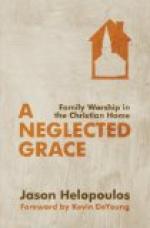Infants are emblems of the loved and sainted ones in heaven. “Of such is the kingdom of heaven.” “Except ye become as this little child, ye cannot enter into the kingdom of heaven.” This is based upon proper principles. The heart of the child is purely devotional and confidential. It is a helpless dependent upon the parent. It abdicates its self-will with joy; silently do the laws of home control it; its reverence and love are the melody of its being; its life is an exchange of obedience for protection. Its path is chosen for it by the lamp of parental experience, and the calm pure light of a mother’s love. How close it keeps to the heart that loves it, and to the hand that leads it! It looks without doubt or suspicion in the parent’s eye, and makes the parent’s home and interest its own.
Here is a picture of the true child of God in his tent-home on earth, and in his eternal home in heaven. For this they are given to us. As they are to us, their parents, so should we be to our Father in heaven, and so are all those loved and sainted ones who have gone before us.
“Little children, flowers from heaven,
Strewn on earth by God’s
own hand,
Earnest emblems to us given,
From, the fields of angel-land!”
Hence it was that Jesus loved little children, took them in His arms, blessed them, and regarded them as “the lambs of His flock.” “He shall gather the lambs with His arm.” He gazed with pleasure into their sweet faces, invited their parents to bring them unto Him, and held them up as the type of the spirit and character of the admitted, into heaven. And the aged John, having in view this typical character of children, addressed his followers as his little children!
Infants are helpless dependents upon others for subsistence and protection. If abandoned at their birth, their first breath would soon be succeeded by their last. Hence they demand all the attention which maternal love and tenderness can bestow. They live like the tender bud or the opening blossom, exposed to the blight of a thousand fortuitous events. Hence their existence is very precarious; in a moment they may sink like the frosted flower in its lovely blush. This may be said of the soul as well as of the body and mind. What an argument, therefore, we have here for parental diligence and promptness in duty to the eternal as well as to the temporal well-being of the child.
The infant is the first prophecy of the man. It is the germ of manhood. It is the man in a state of involution. It is the undeveloped man. Infancy is the twilight of life,—the first morning of an endless being, the age of germ and of mere sense. As the first dawn of spring is the season of the undeveloped harvest, so childhood is manhood in possibility. The infant is the vernal bud of life; it is a being of promise and of hope,—the prophecy of the future man. Hence the age of education. The mother, in the nursery, is ever




